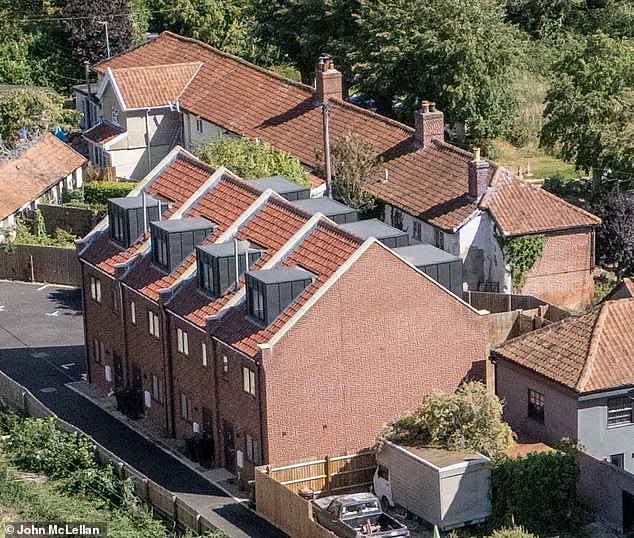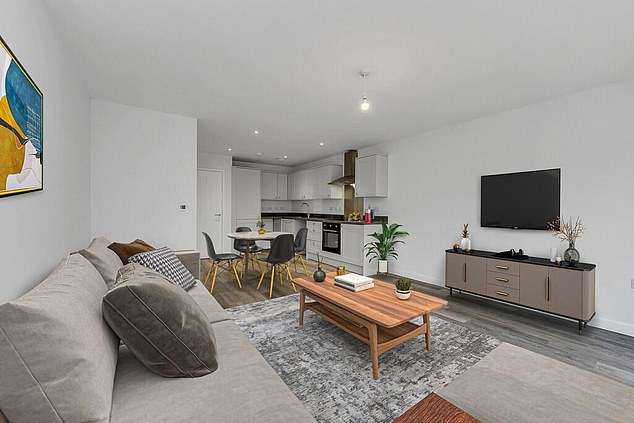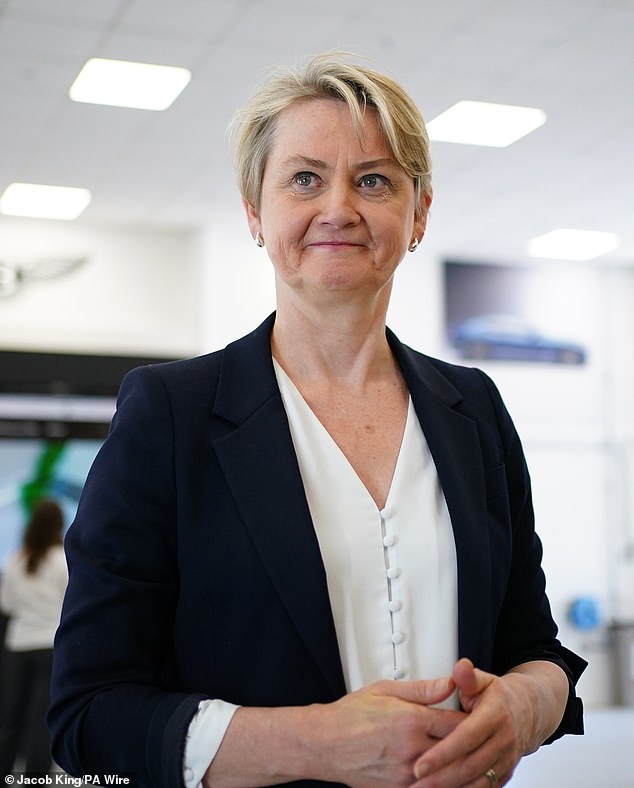Nearly twice as many asylum seekers are staying in taxpayer-funded homes instead of hotels as the government lures private landlords with offers of five years of guaranteed rent.
Public anger over immigration has focused over the use of hotels to house migrants who are waiting to hear the outcome of their asylum claims. A total of 38,000 people were staying in hotels by the end of December at a cost of £5.5million per day.
But this was eclipsed by the 66,000 kept in ‘dispersal accommodation’, which mainly consists of privately rented homes shared by people at once.
While the Home Office insists this is a cheaper option than hotels, it has prompted anger among Britons who are themselves struggling with a lack of social housing.
And their frustration has only grown following recent revelations that some of the homes being reserved for asylum seekers are costly new-build properties.
These include four townhouses in Suffolk, which cost £300,000 and include luxury features such as ensuite bathrooms, underfloor heating and EV charging points.
This particular case attracted the attention of Elon Musk, the world’s richest man, who responded to the Mail’s story about the controversy by writing: ‘This must stop now.’
With almost 800 people waiting for a council or housing association home in the wider district council area, locals have queried why the homes were not turned over to social housing authorities.

The use of this row of houses (front, left) in a small village in Suffolk as migrant accommodation recently sparked a fierce row

Public anger over immigration has focused over the use of hotels to house migrants who are waiting to hear the outcome of their asylum claims. Pictured: A protest in West Drayton
The Suffolk village, which the Mail is not naming, has just over 200 households in total and a population barely two and a half times that.
One listing quoted a monthly rent of £1,200 per property per month – £72,000 over five years. Home Office outsourcer Serco guarantees no gap in rent payments as they move asylum seekers in and out as their applications are considered. Who would say no?
Alongside a pledge of ‘no void period’ – i.e. ‘we’ll pay you, even when it’s empty’ – Serco says it will carry out repairs and maintenance, and carry out monthly inspections to ensure homes remain fit for habitation.
It will also cover the council tax and utility bills on behalf of the asylum seekers living there, all funded by the taxpayer.
For a landlord, it makes perfect business sense – and Serco does its damndest to make the prospect of leasing to them lucrative.
Marcus Wright, managing director of Bolton Business Finance, has helped landlord clients arrange finance for properties they then leased to Serco.
He told the Mail: ‘It’s nothing new in property investment. There is often a clear financial incentive, with the lease agreements often paying 30-40 per cent above market rents and ongoing maintenance covered.
‘Although – it does make it harder to get a buy to let mortgage, with only a small number of specialist lenders that charge higher rates.
‘Ultimately, it’s up to the government how they procure any housing they require and not for property investors to get into the politics of it.’

Elon Musk, the richest man in the world, has sounded off over the use of the homes on his social media website X

Responding to the Mail’s article on the townhouses, he wrote: ‘This must stop now’ (above: his tweet)
‘We are confident that our lease provision offers an attractive and competitive proposition within the industry,’ it says, as it lists selling points such as guaranteed income and repairs paid for.
Its webpage even features a boast from one subcontracted landlord, who said they had been able to buy more houses thanks to taxpayers.
‘Over the three years I have worked with Serco I have increased my housing stock,’ they said.
Each of the Government’s contractors sing from the same hymn sheet: both Clearsprings and Mears also encourage landlords to hand over properties in exchange for guaranteed income and no worries over maintenance.
While Serco manages properties in the Midlands, East of England and the North West, Clearsprings is contracted for the South and Wales; Mears houses asylum seekers in the North East, Yorkshire and the Humber, Scotland and Northern Ireland.
That will ultimately come at a cost to those looking for rental accommodation – and landlords have been told to exercise caution, and to carefully review the contracts they’re being offered.
Shadow home secretary Chris Philp warned earlier this year: ‘Accommodating illegal immigrants in flats takes up valuable space needed by our own young people.’

According to promotional materials, the homes are ‘nestled in the tranquil and sought-after village’ and ‘designed for modern living and comfort’

Public anger over immigration has focused over the use of hotels to house migrants who are waiting to hear the outcome of their asylum claims. Pictured: A protest in West Drayton

While unpopular, using housing for asylum seekers is much cheaper than hotels such as the Britannia in Canary Wharf (pictured: Stand Up To Racism activists outside the London hotel)
Nathan Emerson, CEO of Propertymark, said: ‘The upturn of private companies offering non-traditional options (for renting) can seem appealing as it can provide a fixed, reliable, and hassle-free income stream by eliminating concerns about void periods, late rent payments, and tenant management, but caution is essential.
‘Some contracts may be heavily skewed in favour of providers; therefore, it is crucial for landlords to thoroughly understand their legal rights and obligations before signing any agreements and to seek professional advice, as some contracts can be complex and difficult to reverse.’
Serco’s 10-year contract with the Home Office was initially valued at £2.1billion, and began in 2019 under the Theresa May government.
That has since ballooned to £5.5billion, according to a National Audit Office report published in the summer.
Alongside contracts with Clearsprings and Mears, the Home Office’s asylum accommodation bill is now thought to be £15.3bn between 2019 and 2029.
Despite the recent furore over migrant hotels, the vast majority of asylum seekers – around two thirds – live in homes like this, known as ‘dispersal accommodation’, while they have their applications considered.
As of December, there were 66,262 asylum seekers in dispersal accommodation, of whom almost 30,000 were looked after by Serco in some 7,000 homes.
At that time, there were also some 38,213 asylum seekers in hotels across all three providers – a figure that has now dropped to 32,000 as of June. Around 70,000 are now in dispersal homes.
At the heart of the row is also an inconvenient truth: the Government, as it is now, is obliged by law to look after destitute asylum seekers while it considers their claims.
And ultimately, for those who want to see the asylum bill come down, private accommodation is the way forward.
Hotel costs made up 76 per cent of costs in 2024/24 – but just 35 per cent of the housing.

Home Secretary Yvette Cooper has unveiled drastic changes to the asylum system including a pause on reuniting refugee families
And according to the National Audit Office, the Home Office estimated that hotel accommodation costs rose to £145 per person per night by early 2023, compared to just £14 per night for dispersal accommodation.
Ministers say they are bringing down the asylum bill by cutting back on hotel use, slashing costs by a billion pounds in the last year.
So if landlords who have snapped up plush new-build accommodation want to put it forward for use by asylum seekers in exchange for easy income, it is a better deal for taxpayers than putting someone up in Canary Wharf or in Epping.
On Monday, Home Secretary Yvette Cooper unveiled sweeping changes to the asylum system including a pause on reuniting refugee families, telling MPs the system had to be ‘controlled and managed’.
Blaming the last Conservative government for leaving the system in ‘chaos and disarray’, Ms Cooper said her changes would bring in ‘greater fairness and balance’.
‘The whole system needs to be properly controlled and managed, so the rules are respected and enforced, and so governments, not criminal gangs, decide who comes to the UK,’ she said.
She also revealed that the first returns of asylum seekers who arrived on small boats were set to begin later this month as part of a new deal with France.
Shadow home secretary Chris Philp dismissed plans to tighten rules on those granted asylum bringing family members to the UK as a ‘tiny tweak’.
‘I’m afraid the truth is this is a tiny tweak that will make very little difference,’ he told BBC Breakfast.
Labour says it will close all asylum hotels by 2029.
For now, however, thousands continue to sit in hotels as, in a tiny village in Suffolk, new tenants are found for four new-build townhouses – and the owners pocket a heap of easy cash.
Serco told the Daily Mail it would not comment on specific arrangements for individual properties.
A spokesperson said: ‘We work with private landlords to source a mix of available accommodation in both houses of multiple occupation and family properties within a rent cap set by the Home Office.’












